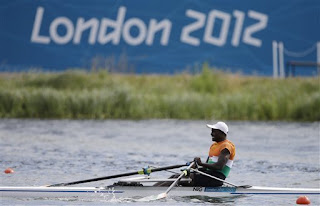 |
| If you're going to pick a sports figure to be a hero, make it Hamadou Djibo Issaka of Niger. |
I used to think my dreams of being an Olympic
athlete were over. Other than my lack of
world class skill or speed in a specific discipline as well as the needed time
to devote to acquiring the skill or speed that would land me on the Olympic
team, I have everything it takes to be an Olympian. But that was before I saw Hamadou Djibo Issaka of Niger.
First, some quick facts about Niger. It's a landlocked country in western Africa that ranks 186th out of 187 countries in the United Nations Human Development Index. I don't know what that means, exactly, but I know it's not good. They have one Olympic medal in the country's history. (Any guesses?) It was a bronze in boxing in 1972 (good guess.)
Niger has competed in 10 Olympic games beginning in 1964. However, I couldn't tell you what they wore during the opening ceremonies, who carried their flag in the parade of nations or if NBC even bothered to show them when they walked in. In fact, before last week, the most I knew about Niger is that my friend who teaches social studies in middle school is always extremely careful in who he calls on to read in class when Niger is involved.
Now this may come as a surprise to you, as it did to me, but Niger doesn't exactly have a glorious rowing history. That is to say, they have no rowing history. The country is roughly 80 percent desert and there aren't a lot of large bodies of water available to practice rowing.
This is where Issaka comes in. Issaka is a former swimmer turned rower. And by "turned rower," I mean first set foot in a boat last November. He immediately overturned it.
But Issaka didn't let a little thing like having to train in a wooden fishing boat because there wasn't a scull (competition boat) in his country deter him from becoming an Olympian. Granted an Olympic spot under a program from the International Olympic Committee that ensure each country can be represented, he set his mind to rowing in the Olympics.
I happened to be watching when his heat came on and I figured I could devote a few minutes to a sport I won't care about for another four years. After all, if I can't get in to rowing in the Olympics, when can I?
The gun fired and all the other competitors took off like they'd been training for more than three months. Issaka, meanwhile, took off like a man who first set foot in a scull a week before the race, because that's exactly what he was. He would later say he was just happy he didn't tip the boat over while waiting for the race to start.
I was captivated by this African man who started slow and got progressively slower and slower. But he rowed.
And rowed.
And rowed.
Cutting his way through Dorney Lake in Great Britain
Issaka was well out of the screen after 30 seconds. But he kept rowing.
And rowing.
And rowing.
The leaders all finished the race and Issaka kept
rowing. For more than two minutes after everyone else had completed the race,
Issaka kept rowing. And as he was, the crowd showered him with cheers and
applause for his efforts.
He had no dreams of winning a medal, or even winning a heat. But he pressed on, serving as an inspiration for millions around the globe who believe they, too, given the chance just want to compete for their country.
Issaka has already said he’s focused on improving
his time for the 2016 games in Rio. And Niger has acquired four sculls and some
oars to allow for more than a week of training.
Four years ago, I’d likely have spent this entire
post making fun of Issaka, ridiculing him for attempting as ridiculous as trying
to compete in the Olympics in a sport you just took up three months ago.
Today,
I’m an admirier and a fan of Issaka. He, more than anyone else I’ve seen at
this year’s games, have reminded me that winning is defined in many ways.
Issaka may not have won a medal, or a heat or even finished before any other competitor. But just by starting, he won.

No comments:
Post a Comment